- Home
- Seanan McGuire
Midway Relics and Dying Breeds
Midway Relics and Dying Breeds Read online
The author and publisher have provided this e-book to you without Digital Rights Management software (DRM) applied so that you can enjoy reading it on your personal devices. This e-book is for your personal use only. You may not print or post this e-book, or make this e-book publicly available in any way. You may not copy, reproduce, or upload this e-book, other than to read it on one of your personal devices.
Copyright infringement is against the law. If you believe the copy of this e-book you are reading infringes on the author’s copyright, please notify the publisher at: us.macmillanusa.com/piracy.
Contents
Title Page
Copyright Notice
Begin Reading
The trouble began a long time before it finished, but it felt like it first started when the westward portage rope snagged on a tree. That wouldn’t have been the end of the world—you float your equipment through a forested area, you learn to expect a little snag-and-tag from the landscape. The Greenies would rather we skirted our balloons higher to avoid branch breakage, but there’s no way to do that without burning more fuel and sacrificing maneuverability, which is more trouble than it’s worth. Besides, all the forests we have to contend with are the fast recovery kind, eucalyptus down NorCal way and pines and scrub fir in Cascadia. A few broken branches are nothing to trees like that, and the kind of damage we were apt to do fell well within the acceptable tolerances for our license. No big deal.
Thing was, the westward portage rope was attached to Billie’s harness, and Billie, for all her advantages as a draft animal, is about as smart as damp moss when it comes to things like “noticing external stimuli.” She’s a genework Indricothere that my Uncle Ren and I bought from a fly-by firm about six years back—a sort of precursor to the rhinoceros, and one of the largest land mammals ever to walk on the planet. When she put down her foot, the ground shook. There were no predators that could take her down and no threats that she recognized as worth giving a damn about, all of which combined to mean that there wasn’t much that could distract her from the essential task of eating her way through the foliage of the world. All nine tons of her continued plodding relentlessly forward, her massive teeth stripping branches as she walked. Her grazing license typed her as a firebreak, preventing fires by clearing out all the dead stuff before it could go up. It was more than halfway true, and it hadn’t caught us any trouble yet.
Her harness shook as the westward portage rope pulled, until the vibrations traveled all the way to the howdah on her back. The bench swayed alarmingly, causing my cousin Bay to flash me a look that was half terror, half accusation. The kids seated on Billie’s neck kicked her, to no avail. The Indricothere lumbered on.
My radio crackled. I unclipped it from my belt, already knowing what I was about to hear. “This is Ansley. You’re a go.”
“We’ve lost steerage and we’re about to snag the Ferris wheel on a treetop,” snapped the voice of my cousin Davo. “You want to stop your pony?”
“She’s not a pony. She’s an Indricothere.” I knew better than to correct him. Somehow I just couldn’t stop myself.
“Don’t care. Make her stop before she breaks something we can’t afford to repair.” The radio crackled again as Davo hung up on me. I said a bad word, clipped it back into place, and shoved Billie’s reins at Bay, who was only riding with me because she didn’t like being cooped up inside the howdah with the rest of the laydown team. “Here. Take her.”
Bay looked alarmed. Coward: I would have been thrilled to be given control of a giant prehistoric monster when I was seventeen and trying to prove myself with the carnival. Now I was just twenty-three and tired of dealing with younger cousins who didn’t have any flexibility in their spines. “What should I do if she tries to go somewhere I don’t want her to?”
“Go there,” I replied promptly. “You don’t think we can steer her, do you?”
Bay was still staring at me in horror as I grabbed the belay rope and swung myself down to Billie’s side. The hair there was thick and coarse, almost a foot long, and perfect for using as a handhold. After clipping the belay rope to my belt next to the radio, I pulled myself hand over fist along Billie’s neck, knocking younger cousins aside as I made my way to her head. The kids laughed, catching themselves with fistfuls of Billie’s shaggy hair as they let me pass. They knew the pecking order here, and that they rode on Billie at all thanks to my good temper.
It took almost five minutes, but I finally reached the base of her massive skull. I dropped the belay rope in favor of grabbing her right ear and using it to haul the rest of me onto the flat plain above her muzzle. She didn’t even twitch as she continued plodding patiently onward, a prehistoric eating machine content to do what she did best.
“Hiya, Billie-girl,” I said, settling into a cross-legged position atop her head. “Time to stop.” I grabbed both ears this time, pulling them sharply downward. It wasn’t enough to hurt her—nothing I could do would be enough to hurt her, unless I did it with a chainsaw or some monowire—but it was something she would notice, and her training was built on the back of things that actually caught her attention. Billie snorted, raising her head a little. I pulled down harder. Finally, with a geological shudder, the vast bulk of the Indricothere began drifting to a halt.
Shouts and callbacks rose from the wagons and carry-kits around us as the cousins spotted Billie’s change of pace and began stopping their own conveyances. Most of them were lucky: they were being pulled by more traditional draft animals, ponies and mules and one tired old elephant we’d rescued from an animal rights group that had been planning to return the poor gentleman to a “natural habitat” he’d never encountered and wasn’t equipped to survive. I’ve got nothing against Greenies who think that wild animals should be left there. Most of the zoos were closed before my day even dawned. But there’s a big difference between saying “we’re not going to breed any more tigers” and “we’re going to put oversized, temperamental housecats that have never hunted in their lives back in the jungle and figure that instinct can do the rest.” Those jungles have been littered with dead tigers—and dead elephants—since that aspect of the movement started rolling.
The trouble with wanting to do the right thing is that frequently the right thing today is the wrong thing for tomorrow, or the wrong thing for the people who are standing between you and your perfect, platonic future. The wild was the wrong place for our elephant, just like the recycler was the wrong place for Billie, and the cities were the wrong place for me.
The big Indricothere finally halted her forward drift. Putting her ears back to signal confusion and mild annoyance, she bowed her head and munched on a particularly appealing patch of overgrown blackberry tangle. I stood, turning to wave to the balloon that floated serenely above us, tethered to the howdah by the remaining ropes. My radio crackled again. I unclipped it.
“Yes, cousin?”
“That damn pony of yours stopped for the night?” Davo still sounded annoyed. I was going to pay for that later. I always did.
I thought about reminding him again that Billie wasn’t a pony, and decided that it wasn’t worth the effort, or the argument that would inevitably follow. I looked back at her. She was still eating blackberries, jaws working with the single-minded focus of a creature that still had three or four tons of growth ahead of her. “Pretty sure,” I said.
“Then get up here. We have ropes to secure before we make camp, and I want us in Portland by tomorrow night.”
“Be right there,” I said, and clipped my radio back into place, taking a moment to stretch languidly before swinging myself down from Billie’s head and starting the climb toward the howdah. Behind me, Billie continued to chew contentedly,
her teeth grinding blackberry vines so loudly that it was audible to everyone around us.
There are tasks that are never finished. When you’re part of the last traveling carnival on the West Coast—and maybe beyond—that includes just plain staying alive.
* * *
It took the better part of the afternoon to let out enough air to bring the blimps down from the tree line. It was a slow process; not only did we have to control the bleed in order to keep the envelopes inflated enough that we’d be able to move in the morning, but we had to keep those same envelopes from being punctured by the trees as they descended. Our permits allowed for a certain amount of wear while we were traveling through fast recovery forest—nothing’s been forced down to zero impact when off the main roads, thank whoever’s up there, because when that day comes, we’re going to have a world of trouble land on our heads. What our permits didn’t allow was cutting branches just because we wanted to land a blimp in the middle of a forested area. The younger, spryer cousins swarmed up the trees like monkeys, risking their necks as they weighed the branches down or pulled them back, out of the way.
That used to be my duty, before age and puberty and common sense caught up with me and left me better suited for safer, less suicidal activities, like Indricothere wrangling. Billie might be a prehistoric horror from the dawn of the mammalian age, but she didn’t want me to climb thirty feet up a scrub pine, and that was good enough to make her my best friend in this or any other world.
Bit by bit, we reeled in the ropes and brought down the balloons, and we pulled a carnival out of the sky.
Davo took over the process once the first of the attractions touched the ground, pushing me to the side with a muttered instruction to see to the animals. I went without complaint. Davo and I haven’t gotten along since I was sixteen and refused his offer of an honest marriage, preferring to spend my time learning the trade of my fathers and the techniques of the modern world, which was changing our lives, whether we wanted it to or no. The pace of the carnival is an old thing, old and tired and slow, speeding up only when it comes time to illuminate the midway and chase down its prey. We were as much a living fossil as Billie. Maybe that was why I loved her so dearly. She was out of her time, and always would be, until the day that gravity proved to be too much for her huge and hammering heart.
Billie required no settling. She didn’t even need to have the howdah unstrapped from her back. The thick fur on her shoulders and haunches kept the straps from cutting into her skin, and she would be standing and eating until morning. Her metabolism was slow but steady. If she stopped eating for too long, she would die.
The other animals, the ponies and mules, the buffalo and the old elephant, they required a bit more care, in the form of loosening their harnesses in order to let them forage. Humans were the only animals forbidden to mess with the undergrowth ecosystem around here. The aggregate individuals formed by the smart-dust enhanced plant and animal communities in the forest might object, but they would come to the consensus that a horse was allowed to graze, that an elephant was allowed to urinate, and that a mule was allowed to kick its handlers in the ankles. Humans got a rougher saw, because we were more likely to be viewed as the enemy. Can’t say I blamed the biological communities for that. They had rights only because they were computer-centralized corporations now, and they knew—as much as they could “know” anything, being a collection of critters with short lifespans and shorter memories—that most of mankind would still be happy to strip those rights away.
Humans can swear and swear that we’re moving toward a better harmony with the living world, but it’s all a smokescreen. We’ve decided that green is good, that’s all. Give us a few more centuries and we’ll change our minds again. If there’s one thing humans are good at, it’s selfishness. Everything else is temporary, as the earth measures time and change.
Some of the smaller cousins ran by, laughing and blowing smoke-filled bubbles with their automated wands. The bubbles themselves were pure soysoap. They’d do no damage, and they might even help the local ecosystem a bit, since they made excellent fertilizer when they popped. Their smoky payload was a different matter. Genegineered fungus designed to bond with smart dust and drop it out of the atmosphere, clouding the sensors and tiny lenses until they couldn’t tell up from down, or rocks from people. More dust would propagate in a matter of days—we weren’t knocking anything offline long enough to hurt it—but in the meanwhile, we’d be able to make our camp and tend to our business in the closest thing this world has left to privacy.
“Ansley.” Bay emerged from the space between two wheel-wagons as she spoke, her brown hair a tangled veil across her brow and eyes. She was a pretty thing, all strong limbs and eyes that seemed too big for her face, thanks to some cunningly engineered bone structure arranged for her while she was in utero. Bay was carnival-born, same as me, but her mother took a few years to “find herself” out among the townies. Don’t know if she ever did “find herself.” She found Bay’s father, and she found some semilegal genetic shell games, and she found Bay. Lost her, too, or maybe left her: Bay fetched up in one of the cars on the Ferris wheel during a high-traffic night when we were camped up near Heddlebrook, putting on a show for the folk who didn’t even know how much they needed one. She was just an infant then, but she came with a mem chip that had all her information encoded on it, even down to the custom modifications on her genotype. That was all we needed to know for sure that she was family.
We never did see Bay’s mama after that. She did what she could for her little girl—she brought her home—and then she was gone. I guess, for her, that was doing the best that she could do.
“Yes, Bay?” I turned to face her, the curry brush still in my hand. Trick riding has been illegal for longer than I’ve been alive, classified as a form of animal cruelty, but owning horses is allowed, and we haven’t been able to bring ourselves to kill the ones we have with kindness. The daughter of a high-strung mustang doesn’t learn to be a wild thing just because you take her out of harness.
Maybe that comparison could apply to Bay as well. She flicked her hair out of her eyes with one hand and said, “Davo wants to see you.”
“Davo wants a lot of things,” I said genially. “I don’t for the most part care about what Davo wants.”
“He says it’s about Grandmamma.”
I froze, the levity dropping out of me like a half-filled balloon dropping out of the sky. “What about her?”
“He didn’t say.” Bay shrugged broadly. “He said to tell you I could finish with the ponies, and you needed to come to his tent right now, because you need to know what’s going on.”
That explained her irritated expression. Bay was a wizard with our twencen attractions, patched and rebuilt monstrosities that they were, but there was little call for a mechanic out here in the woods. Not unless one of the blimps had broken down, and we had a separate maintenance crew for those. And none of that made her even half-qualified to deal with animals.
“All right,” I said, and offered her the curry brush. “The horses still need to be wiped down before you let them loose. Billie isn’t going to move for at least eight hours, but they should get a chance to stretch their legs while we’re stationary.”
“I don’t see why,” she grumbled, and moved past me to take up the grooming duties where I’d left off. I watched for a moment—not long enough that she would take offense at being spied on, just enough to be sure that she remembered what she was supposed to do—before turning and walking into the forest, toward the distant sound of camp.
* * *
Even the densest forest has a surprising amount of open space hidden among the tree trunks and the underbrush. There are natural clearings formed by the competing roots of the towering giants that grow stretching ever toward the sun, and there are the unnatural clearings, places where old pollution and the toxins of a near-forgotten world have blighted the soil. Even those will be gone in a few decades, as remediation reache
s them, but for now they provide a valuable stopping point for people like us, cutting our way through the land while trying to minimize our impact. If someone who passes this way tomorrow can tell that we were here, we didn’t do our jobs correctly.
We run on tradition as much as we do on solar and biodiesel and good, honest sweat. Youngest cousins are coddled and carried, learning the ways of the rope and the road until they’re old enough to start earning their keep. Younger cousins are the wild things of the midway. They range in age from seven to seventeen, and they work as hard as any of us, even if most of them aren’t doing anything more than unskilled labor. Above them stand the cousins, no modifiers needed, who manage the complex systems that keep us all in business, like me with the animals, or my cousin Carrie with the Ferris wheel, which she could probably take apart in her sleep if she felt the need.
And over us stand the Big Men, whose word is law.
Not everyone will be a Big Man. It’s inherited as much as earned, based on a complicated balance of skill and seniority and what your parents once did for the midway. Davo became one of the carnival’s Big Men when his father retired to the Bone Yard up near Portland. Uncle Ren offered to let me retire with him, even though I’m twenty years and two children away from earning my place in the Bones, but I refused. Everyone would know it was because I was getting special treatment, and because once, I had turned down my cousin when he asked me for my hand. He’d known that Davo would make things hard for me now that he was going to be a Big Man and I was still going to be myself. Uncle Ren had been trying to save me.
He didn’t understand how much I loved my charges within the carnival, the horses and the mules and Billie—maybe especially Billie, who would be mulch and gene frags by now if we hadn’t come along exactly when we did, if my Uncle Ren hadn’t foolishly believed that gene-cruncher when he swore that an adult female Indricothere would be no bigger than a bull elephant. I’d already accessed the network data on her species, seen recreated and simulated footage of their herds walking proud across plains that existed before mankind figured out how to come down from the trees. I’d already been in love. There was no way that I could leave her behind, not even to protect myself from the world of pain that I was walking into. So I’d taken her care onto my own shoulders, and there it had remained as she grew, giving me the kind of loyalty that only comes from big dumb herbivores just smart enough to know that it’s good to have a clever keeper.

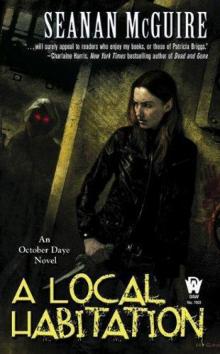 A Local Habitation
A Local Habitation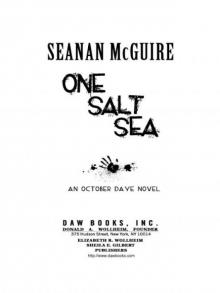 One Salt Sea
One Salt Sea Beneath the Sugar Sky
Beneath the Sugar Sky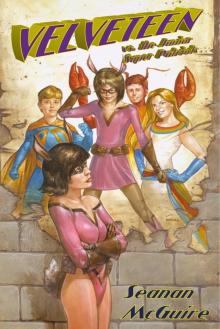 Velveteen vs. The Junior Super Patriots
Velveteen vs. The Junior Super Patriots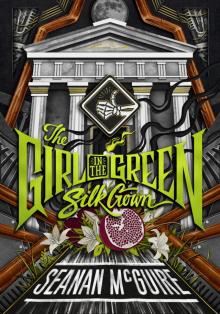 The Girl in the Green Silk Gown
The Girl in the Green Silk Gown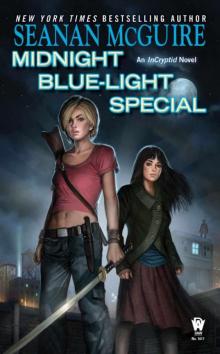 Midnight Blue-Light Special
Midnight Blue-Light Special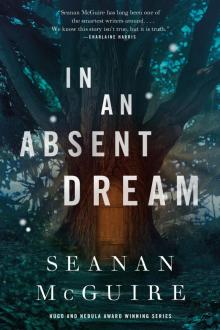 In an Absent Dream
In an Absent Dream Chaos Choreography
Chaos Choreography Indexing
Indexing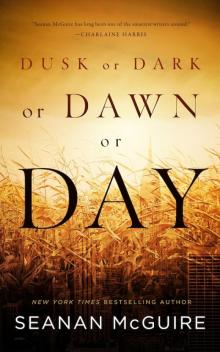 Dusk or Dark or Dawn or Day
Dusk or Dark or Dawn or Day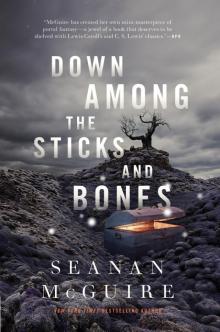 Down Among the Sticks and Bones
Down Among the Sticks and Bones The Razor's Edge
The Razor's Edge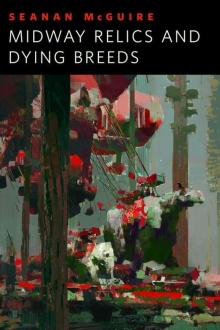 Midway Relics and Dying Breeds
Midway Relics and Dying Breeds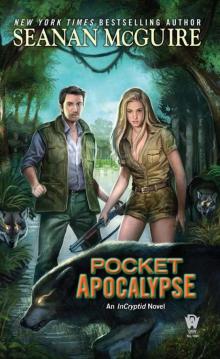 Pocket Apocalypse
Pocket Apocalypse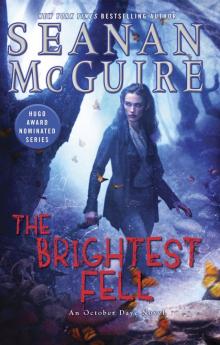 The Brightest Fell
The Brightest Fell Discount Armageddon
Discount Armageddon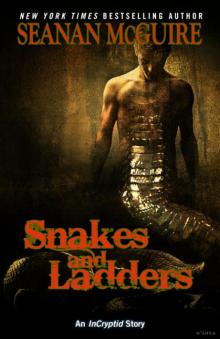 Snakes and Ladders
Snakes and Ladders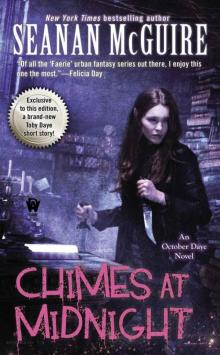 Chimes at Midnight
Chimes at Midnight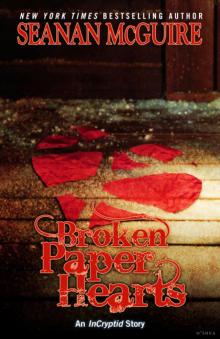 Broken Paper Hearts
Broken Paper Hearts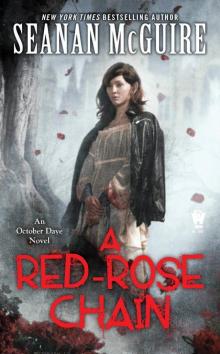 A Red-Rose Chain
A Red-Rose Chain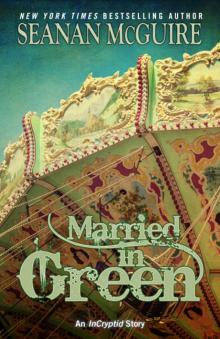 Married in Green
Married in Green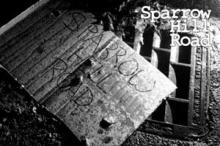 Sparrow Hill Road 2010 By Seanan
Sparrow Hill Road 2010 By Seanan Calculated Risks
Calculated Risks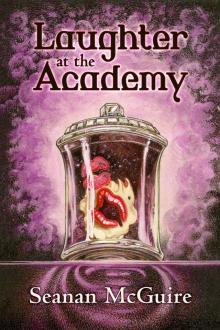 Laughter at the Academy
Laughter at the Academy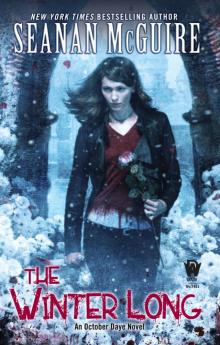 The Winter Long
The Winter Long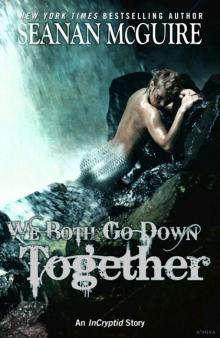 We Both Go Down Together
We Both Go Down Together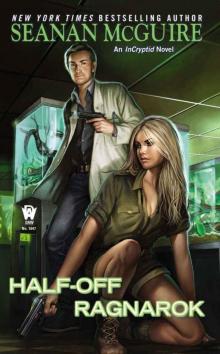 Half-Off Ragnarok
Half-Off Ragnarok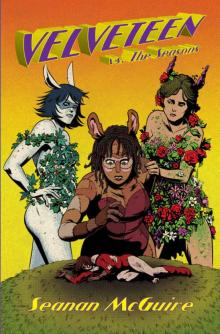 Velveteen vs. The Seasons
Velveteen vs. The Seasons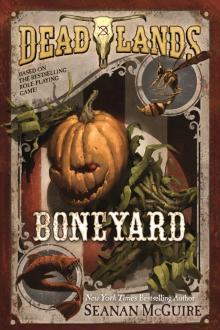 Boneyard
Boneyard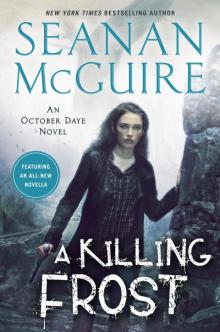 A Killing Frost
A Killing Frost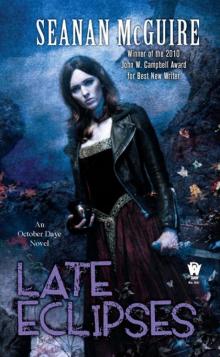 Late Eclipses
Late Eclipses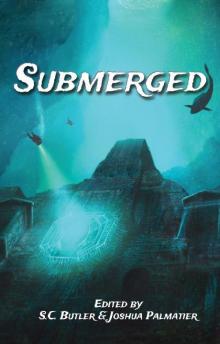 Submerged
Submerged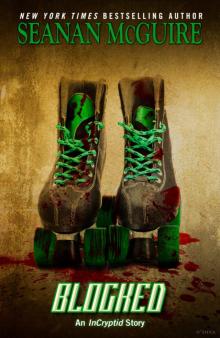 Blocked
Blocked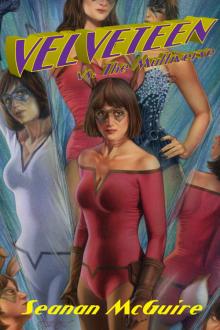 Velveteen vs. The Multiverse
Velveteen vs. The Multiverse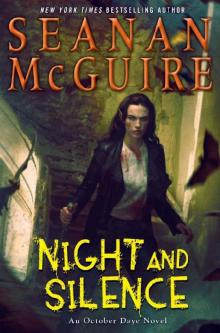 Night and Silence
Night and Silence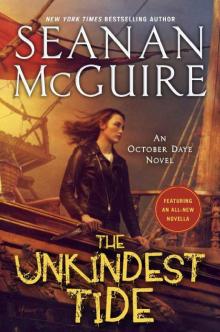 The Unkindest Tide (October Daye)
The Unkindest Tide (October Daye)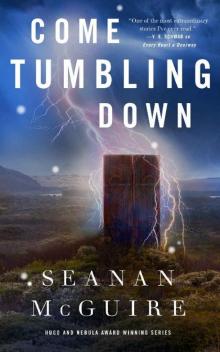 Come Tumbling Down (Wayward Children)
Come Tumbling Down (Wayward Children)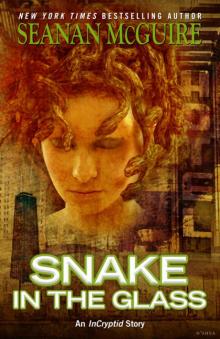 Snake in the Glass
Snake in the Glass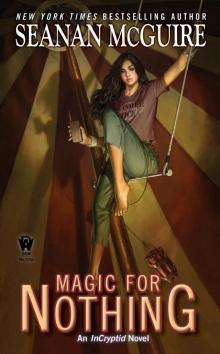 Magic for Nothing
Magic for Nothing Full of Briars
Full of Briars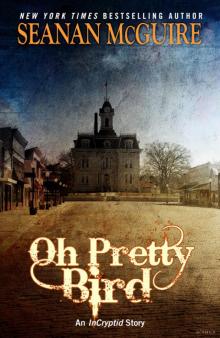 Oh Pretty Bird
Oh Pretty Bird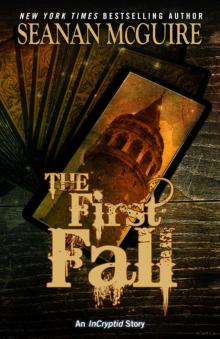 The First Fall
The First Fall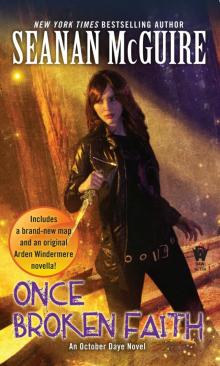 Once Broken Faith
Once Broken Faith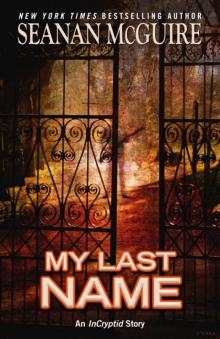 My Last Name
My Last Name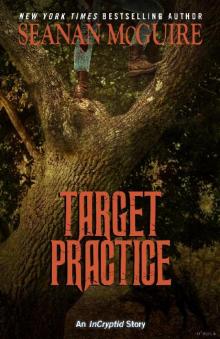 Target Practice
Target Practice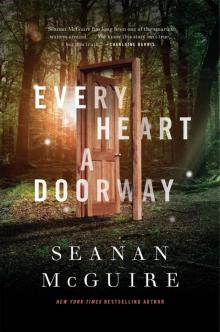 Wayward Children 01 - Every Heart a Doorway
Wayward Children 01 - Every Heart a Doorway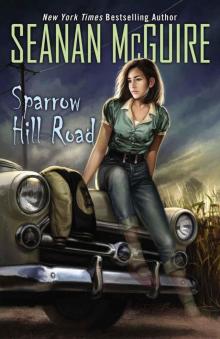 Sparrow Hill Road
Sparrow Hill Road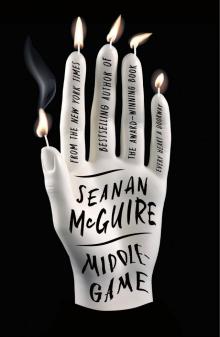 Middlegame
Middlegame Juice Like Wounds
Juice Like Wounds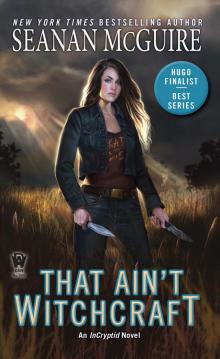 That Ain't Witchcraft
That Ain't Witchcraft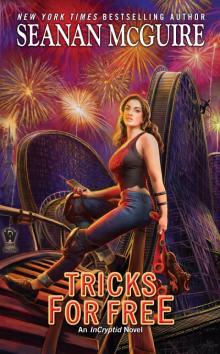 Tricks for Free
Tricks for Free Imaginary Numbers
Imaginary Numbers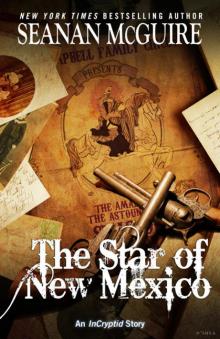 The Star of New Mexico
The Star of New Mexico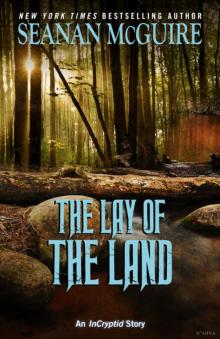 Lay of the Land
Lay of the Land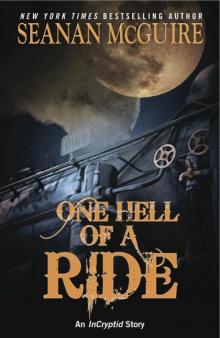 One Hell of a Ride
One Hell of a Ride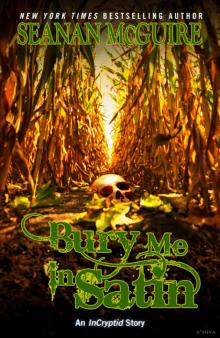 Bury Me in Satin
Bury Me in Satin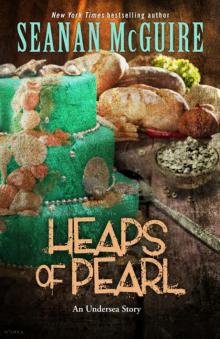 Heaps of Pearl
Heaps of Pearl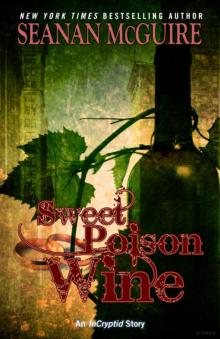 Sweet Poison Wine
Sweet Poison Wine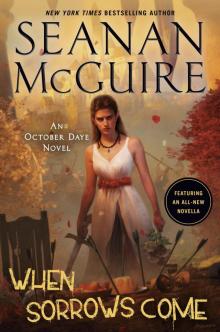 When Sorrows Come
When Sorrows Come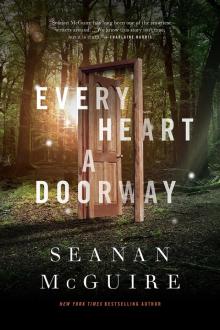 Every Heart a Doorway
Every Heart a Doorway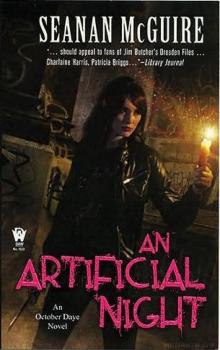 An Artificial Night - BK 3
An Artificial Night - BK 3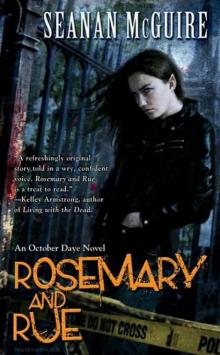 Rosemary and Rue
Rosemary and Rue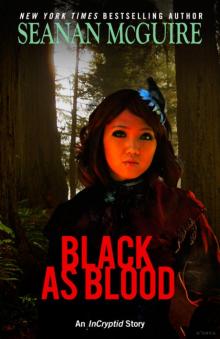 Black as Blood
Black as Blood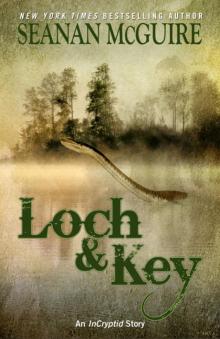 Loch and Key
Loch and Key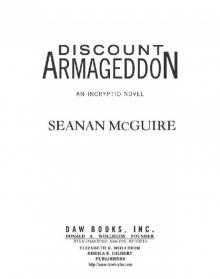 Discount Armageddon: An Incryptid Novel
Discount Armageddon: An Incryptid Novel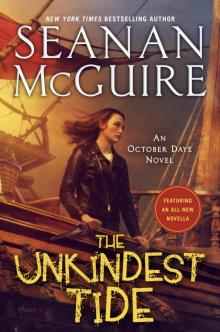 The Unkindest Tide
The Unkindest Tide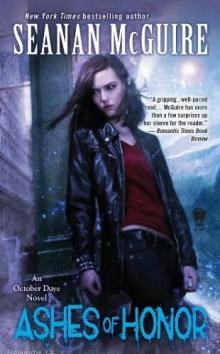 Ashes of Honor od-6
Ashes of Honor od-6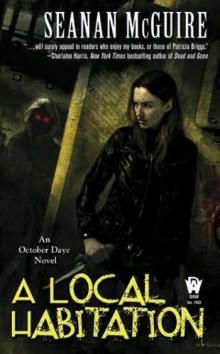 A Local Habitation od-2
A Local Habitation od-2 Waking Up in Vegas
Waking Up in Vegas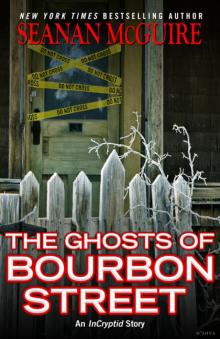 The Ghosts of Bourbon Street
The Ghosts of Bourbon Street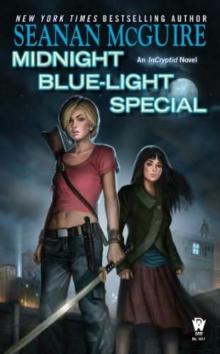 Midnight Blue-Light Special i-2
Midnight Blue-Light Special i-2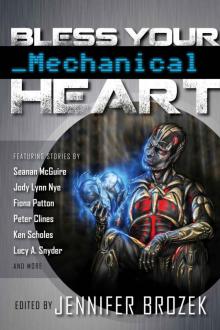 Bless Your Mechanical Heart
Bless Your Mechanical Heart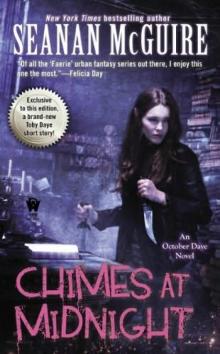 Chimes at Midnight od-7
Chimes at Midnight od-7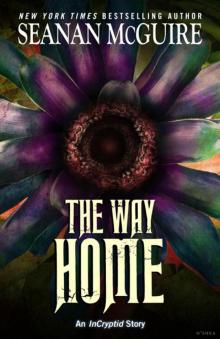 The Way Home
The Way Home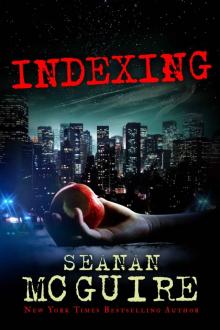 Indexing (Kindle Serial)
Indexing (Kindle Serial)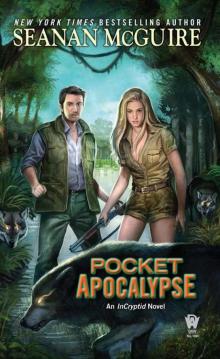 Pocket Apocalypse: InCryptid, Book Four
Pocket Apocalypse: InCryptid, Book Four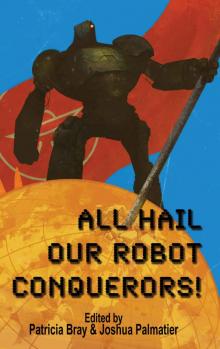 All Hail Our Robot Conquerors!
All Hail Our Robot Conquerors!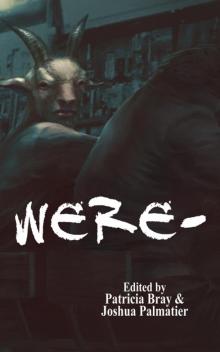 Were-
Were-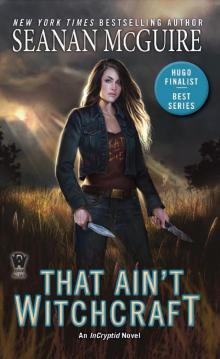 That Ain't Witchcraft (InCryptid #8)
That Ain't Witchcraft (InCryptid #8)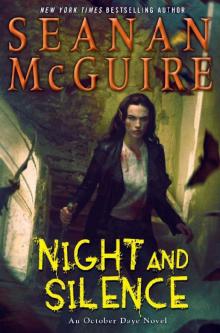 Night and Silence (October Daye)
Night and Silence (October Daye)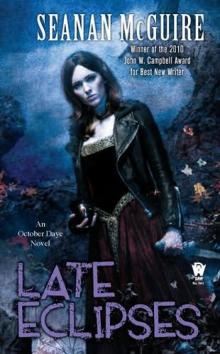 Late Eclipses od-4
Late Eclipses od-4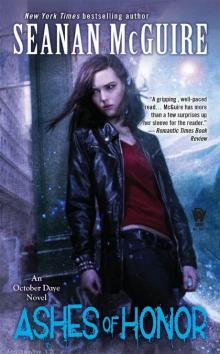 Ashes of Honor: An October Daye Novel
Ashes of Honor: An October Daye Novel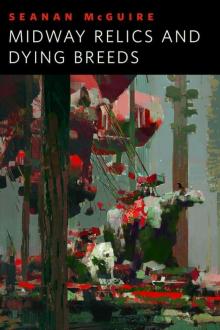 Midway Relics and Dying Breeds: A Tor.Com Original
Midway Relics and Dying Breeds: A Tor.Com Original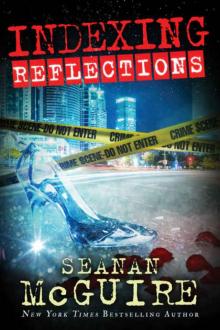 Indexing: Reflections (Kindle Serials) (Indexing Series Book 2)
Indexing: Reflections (Kindle Serials) (Indexing Series Book 2)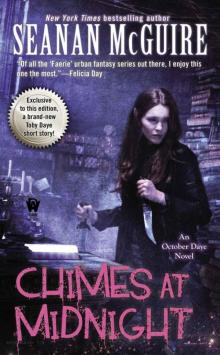 Chimes at Midnight: An October Daye Novel
Chimes at Midnight: An October Daye Novel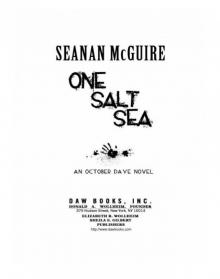 One Salt Sea: An October Daye Novel
One Salt Sea: An October Daye Novel Rosemary and Rue od-1
Rosemary and Rue od-1 Rosemary and Rue: An October Daye Novel
Rosemary and Rue: An October Daye Novel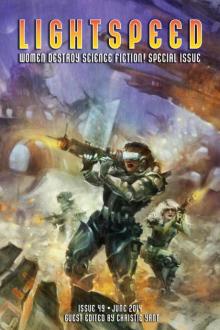 Lightspeed Magazine Issue 49
Lightspeed Magazine Issue 49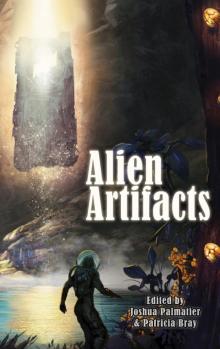 Alien Artifacts
Alien Artifacts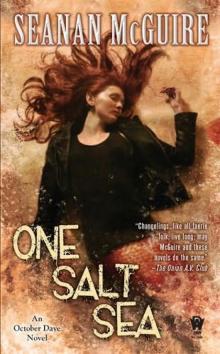 One Salt Sea od-5
One Salt Sea od-5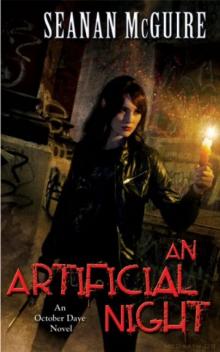 An Artificial Night od-3
An Artificial Night od-3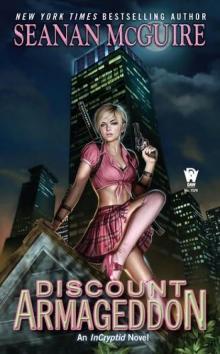 Discount Armageddon i-1
Discount Armageddon i-1